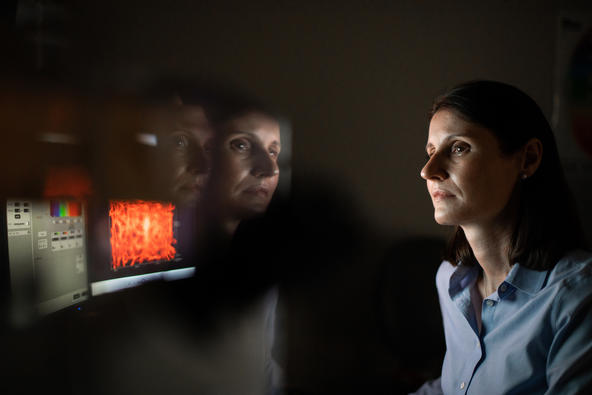Sanders-Brown Researcher Combines Love of Science and Family at UK

Anika Hartz never planned on becoming a scientist.
She’s a pharmacist by trade, who moved to the United States from her home of Germany in 2002 to begin her doctorate at the National Institutes of Health (NIH). At the time, she had no intention of going into science.
“Coming to the U.S. in 2002 changed my mind,” said Hartz.
Her time at the NIH was unique and it marked a turning point for her future.
“They typically only take postdoctoral researchers, but they made an exception and took me on as an unpaid guest researcher,” she said. Hartz was able to complete her thesis working in a top-notch scientific environment.
She remembers her mentor there telling her, “You are being allowed to play in the sandbox.” Hartz says her mentor’s “sandbox” at the NIH was much larger than hers, but that analogy allowed things to really click for her. The realization that she had her own “sandbox” and could even eventually get paid for playing in it helped guide her career path.
“I fell in love with science,” said Hartz. “I could join a pharmaceutical company today and probably make twice as much, but it is the love for science that really motivates me.”
Since 2014, she has been using that love of science to help further research at the University of Kentucky’s Sanders-Brown Center on Aging and the UK College of Medicine’s Department of Pharmacology and Nutritional Sciences. Hartz joined UK together with her husband Bjoern Bauer, Ph.D., who is a professor in the UK College of Pharmacy’s Department of Pharmaceutical Sciences.
“UK and Lexington are a good fit because we are a husband-and-wife research team and came as a package,” said Hartz.
In addition to their roles as researchers, Hartz and Bauer are the parents of three daughters.
“Research is a profession, but it is more like a lifestyle choice for us,” she said. “It is like a little family business. To be successful, I need my kids to play their part. There are times I must be with the lab, times beyond their school day and sometimes on the weekends. So, it is a give and take and I think it's truly a choice. It is definitely more than a job for us.”
She hopes that in the years to come she will see science become a more family-friendly profession. “That is important not only for women but also for the men and it is something that I feel lucky I can do both here along with my husband. We can combine family and science and make it work, some days better than others. That is a big reason we chose to come to UK.”
Hartz says the focus of her research is pretty simple.
“I look at the blood vessels in the brain — the so-called blood-brain barrier — and how they change in Alzheimer’s disease,” she said.
Hartz says she’s not an expert in Alzheimer’s disease, but her background in pharmacy allows her to looks at drugs and therapies that might repair damaged blood vessels in patients with the disease. She is extremely grateful to work at UK, where having numerous colleagues with complementary expertise has been critical for her research as well as the ability to collaborate with colleagues from different fields.
“My research field is fairly small, with about 300 core blood-brain barrier experts worldwide,” Hartz said. “So, working in a small field, it is very helpful to have Alzheimer’s disease experts around me.”
Hartz says the goal is to eventually translate strategies developed in her lab into clinical trials to help patients. “We are hopeful that our work will eventually have an impact on a person’s health.”
More from this series Research Priorities - Neuroscience
Credits
Words: Hillary Smith (Public Relations & Strategic Communication)
Photo: Pete Comparoni (UK Photo)


